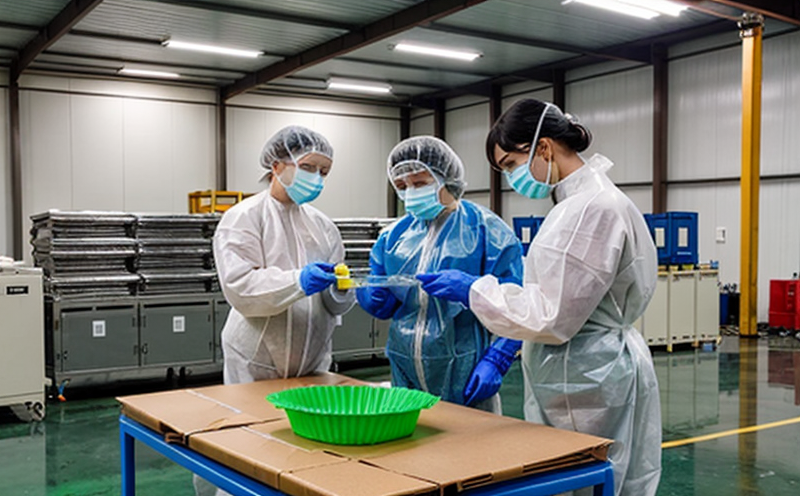ISO 527-6 Tensile Testing for Bottles and Caps
The ISO 527-6 standard is a globally recognized protocol designed to measure tensile properties of plastics, which includes the evaluation of bottles and caps. This service ensures that plastic packaging meets rigorous quality standards, thereby enhancing product integrity and reliability.
For bottles and caps, tensile testing assesses the material's resistance to stretching until failure under controlled stress conditions. The test is particularly important in the packaging sector as it helps manufacturers ensure their products can withstand the rigors of manufacturing processes such as injection molding or blow molding without compromising functionality or safety.
The process involves subjecting a specimen cut from the bottle or cap to tensile forces, typically at specified rates of elongation. The primary parameters measured include maximum load before failure (tensile strength), total elongation at break, and modulus of elasticity (stiffness). These metrics are crucial for understanding how a plastic material behaves under stress, which is essential for optimizing design and production processes.
The testing procedure adheres to strict guidelines outlined in ISO 527-6. Specimen preparation is critical; it involves selecting representative samples that accurately reflect the properties of the entire batch of product. Samples are usually cut from the bottle or cap using specific dimensions, ensuring they meet the requirements for accurate tensile testing.
The test setup typically includes a tensile testing machine capable of applying precise loads and measuring elongation at controlled rates. The machine must be calibrated regularly to ensure accuracy. During the test, stress is gradually applied until failure, whereupon the peak load and other relevant data are recorded. Reporting involves documenting these results in accordance with ISO standards, providing detailed insights into the material's performance.
The significance of this testing cannot be overstated, as it directly impacts product safety, durability, and overall quality. In sectors such as food and beverage packaging, where contamination or structural failure could lead to recalls or health risks, tensile testing is indispensable. Compliance with ISO 527-6 ensures that plastic products meet international standards, fostering trust among consumers and regulators.
In summary, ISO 527-6 tensile testing for bottles and caps is a critical process in the packaging industry. It provides valuable insights into material properties, helping manufacturers make informed decisions about their product design and production processes. By adhering to these stringent tests, companies can ensure their products meet global quality standards, enhancing both safety and reliability.
Applied Standards
| Standard | Description |
|---|---|
| ISO 527-6:1998 | Plastics—Determination of tensile properties—Part 6: Tensile testing of bottles and caps. |
| ASTM D882 | Standard Test Method for Tensile Properties of Thin Plastic Sheeting. |
| EN ISO 527-6:1997 | Plastics—Determination of tensile properties—Part 6: Tensile testing of bottles and caps. |
| IEC 60664-1 | Insulation Coordination and Overvoltage Protection for Electrical Installations—Part 1: General Aspects. |
The application of these standards ensures that the testing is conducted in a standardized manner, providing consistent results across different laboratories. Compliance with ISO 527-6 specifically addresses the unique challenges associated with tensile testing of bottles and caps, ensuring accurate measurement and reporting.
Eurolab Advantages
At Eurolab, our commitment to excellence in quality assurance is reflected in every aspect of our services. Our state-of-the-art facilities equipped with the latest technology ensure that we deliver precise, reliable results for ISO 527-6 tensile testing.
- Precision Instruments: Our equipment is regularly calibrated and maintained to provide accurate measurements.
- Expertise: Our team of experienced professionals ensures that each test is conducted according to the highest standards.
- Rigorous Protocols: We follow strict protocols for specimen preparation, ensuring consistency in testing results.
- Comprehensive Reporting: Detailed reports are provided with all necessary parameters and interpretations.
In addition, Eurolab offers a range of complementary services that can complement ISO 527-6 tensile testing. These include chemical analysis, mechanical property evaluation, and failure analysis. Our comprehensive approach ensures that our clients receive a full understanding of their materials' performance.
Use Cases and Application Examples
| Application Example | Description |
|---|---|
| Food and Beverage Packaging | Ensuring that bottles and caps used in food packaging meet safety standards. This includes testing for resistance to deformation under pressure, ensuring no contamination. |
| Pharmaceutical Packaging | Evaluating the integrity of plastic containers used for drug storage, ensuring they can withstand sterilization processes without compromising product integrity. |
| Beverage Industry | Determining the durability and flexibility of caps used in beverage bottles to ensure a secure fit and prevent leakage during transportation. |
| Consumer Goods Packaging | Testing the strength and flexibility of plastic packaging for consumer goods to ensure it can withstand various environmental conditions without breaking or deforming. |
The results from ISO 527-6 tensile testing are invaluable in these sectors, providing critical insights into material performance. By adhering to this standard, manufacturers can enhance the safety and quality of their products, thereby building consumer trust and satisfaction.





